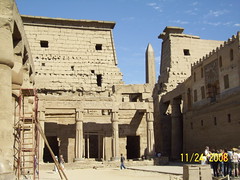
Luxor Temple - Triple Bark Shrine
Originally uploaded by styler78
Luxor Temple, Luxor, (Upper) Egypt. Having visited this temple, there are many memories. At the time, i didn't know to look out for Hatshepsut. I concentrated on the Obelisk of Ramesses II still standing (one of a pair - the second being gifted to France and now residing in Paris), the remaining statues and random spots, hieroglyphs and the many pigeons which call the temple their home.
The temple itself, which we see today has undergone transformations over the years - both during ancient times and also after the Pharonic period.
When i started this project i noticed that there is a wonderful description and also some terrific information relating to the times of Hatshepsut on the always reliable MaatKaRa Hatshepsut website:
http://www.maat-ka-ra.de/english/start_e.htm
Please follow Monuments> Luxor Temple
Dr Karl Leser's work shows us that the Luxor Temple we see today is not the temple that Hatshepsut would have viewed for herself. We have no descriptions by Hatshepsut of Luxor Temple as it was in her day, but the link above shows that her footprints are present.
The photo itself was taken by my wife, Julie and shows the triple bark (barque) shrine of Ramesses II "The Great". It is in this area of the temple, which interests those of us interested in Hatshepsut's influence. We can also see, behind the shrine, the 1st pylon and Obelisk of Ramesses II.
Regards,
Stuart

5 comments:
Hello !
The triple bark shrine of Ramesses II is actually the Hatshepsut's temple. Ramesses reused the temple of the queen and transformed it into a triple shrine, because during the reign of Ramesses, three divine barks were taking part in the Fest of Opet (the processional fest between Karnak and Luxor). But during the reign of Hatshepsut (according to the Chapelle Rouge), only one bark was used.
Have a nice day :) !
Alice- Hi.
Looking at the triple barque shrine at Karnak (Amun/Mut/Khonsu)built by Seti II and the one at Luxor Temple - i wonder of the barque shrine of Hatshepsut was demolished to make way for the Triple Barque Shrine (as it was in a prime location behind Pylon 1 and on the path of the processional route(?)).
- or whether or not Hatshepsuts shrine fell into disrepair and needed to be replaced?
I understand that some of the Thutmoside blocks were still present during the time of Ramesses II- as they were incorporated within the triple shrine.
This from Dr Karl Leser:
"Later, Rameses II reused parts from an older bark shrine built by Hatshepsut when he erected the triple bark shrine inside his courtyard"
(http://www.maat-ka-ra.de/english/start_e.htm)
Thanks,
Stuart
Alice- i am now on the hunt to locate the Chapelle Rouge inscriptions. This follows your mention of these in your comment above.
Do you know of any reliable source for the full inscriptions?
I am looking at Dr Lesers site and there's a lot of information there.
Thanks,
Stuart
I'm currently working on the Chapelle Rouge Inscriptions, so I'va a french translation of the full text :). The best books for the Chapelle Rouge are in French : * P. LACAU – H. CHEVRIER, Une chapelle d'Hatshepsout à Karnak, 2 volumes, Le Caire, 1977-1979
* F. BURGOS – F. LARCHÉ, La chapelle Rouge. Le sanctuaire de la barque d'Hatshepsout, 2 volumes, Paris, 2006.
The first volume of the LACAU – CHEVRIER mentions the translation of all the texts of the Chapelle, the second, all the photographies.
The first volume of the BURGOS – LARCHÉ is a photographic one. The photographies are very beautiful and are accompanied by drawings of all the blocks. The second one describes the anastylosis of the Chapelle. It also contains some very interesting plans of the construction of the Karnak temple.
If you have more question, I'll be very happy to help you !
Congratulations for your site !
Have a nice week.
Alice
Hi Alice,
Thanks again for the information. I will gladly get back to you about the inscriptions.
This is an area i would like to study in greater detail than i am able to cope with at present. Please do feel free to let me know how your studies go. It is a very interesting subject matter.
Thanks for the offer,
Regards,
Stuart
Post a Comment